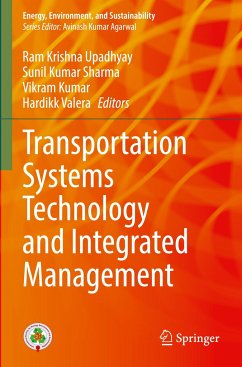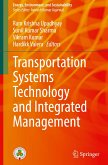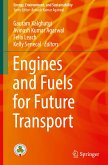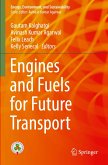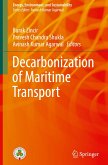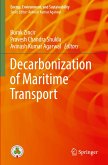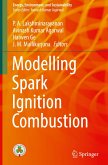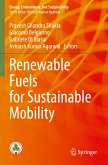Transportation Systems Technology and Integrated Management
Herausgegeben:Upadhyay, Ram Krishna; Sharma, Sunil Kumar; Kumar, Vikram; Valera, Hardikk
Transportation Systems Technology and Integrated Management
Herausgegeben:Upadhyay, Ram Krishna; Sharma, Sunil Kumar; Kumar, Vikram; Valera, Hardikk
- Broschiertes Buch
- Merkliste
- Auf die Merkliste
- Bewerten Bewerten
- Teilen
- Produkt teilen
- Produkterinnerung
- Produkterinnerung
The book highlights the transportation ecosystems and its management with underlying technologies for futuristic freight and passenger movement. The contents include contributions on climate change impact on transportation infrastructure, enhancing multimodal transportation, solar energy in railways, managing public transportation with technology, among others. It also includes chapters of newly developed technologies for the intelligent transport system. This book is a useful guide to those working in academia and industry in transportation technology.
Andere Kunden interessierten sich auch für
![Transportation Systems Technology and Integrated Management Transportation Systems Technology and Integrated Management]() Transportation Systems Technology and Integrated Management161,99 €
Transportation Systems Technology and Integrated Management161,99 €![Engines and Fuels for Future Transport Engines and Fuels for Future Transport]() Engines and Fuels for Future Transport117,99 €
Engines and Fuels for Future Transport117,99 €![Engines and Fuels for Future Transport Engines and Fuels for Future Transport]() Engines and Fuels for Future Transport117,99 €
Engines and Fuels for Future Transport117,99 €![Decarbonization of Maritime Transport Decarbonization of Maritime Transport]() Decarbonization of Maritime Transport117,99 €
Decarbonization of Maritime Transport117,99 €![Decarbonization of Maritime Transport Decarbonization of Maritime Transport]() Decarbonization of Maritime Transport117,99 €
Decarbonization of Maritime Transport117,99 €![Modelling Spark Ignition Combustion Modelling Spark Ignition Combustion]() Modelling Spark Ignition Combustion162,99 €
Modelling Spark Ignition Combustion162,99 €![Renewable Fuels for Sustainable Mobility Renewable Fuels for Sustainable Mobility]() Renewable Fuels for Sustainable Mobility125,99 €
Renewable Fuels for Sustainable Mobility125,99 €-
-
-
The book highlights the transportation ecosystems and its management with underlying technologies for futuristic freight and passenger movement. The contents include contributions on climate change impact on transportation infrastructure, enhancing multimodal transportation, solar energy in railways, managing public transportation with technology, among others. It also includes chapters of newly developed technologies for the intelligent transport system. This book is a useful guide to those working in academia and industry in transportation technology.
Produktdetails
- Produktdetails
- Energy, Environment, and Sustainability
- Verlag: Springer / Springer Nature Singapore / Springer, Berlin
- Artikelnr. des Verlages: 978-981-99-1519-4
- 2023
- Seitenzahl: 504
- Erscheinungstermin: 5. Mai 2024
- Englisch
- Abmessung: 235mm x 155mm x 28mm
- Gewicht: 756g
- ISBN-13: 9789819915194
- ISBN-10: 9819915198
- Artikelnr.: 70598788
- Herstellerkennzeichnung Die Herstellerinformationen sind derzeit nicht verfügbar.
- Energy, Environment, and Sustainability
- Verlag: Springer / Springer Nature Singapore / Springer, Berlin
- Artikelnr. des Verlages: 978-981-99-1519-4
- 2023
- Seitenzahl: 504
- Erscheinungstermin: 5. Mai 2024
- Englisch
- Abmessung: 235mm x 155mm x 28mm
- Gewicht: 756g
- ISBN-13: 9789819915194
- ISBN-10: 9819915198
- Artikelnr.: 70598788
- Herstellerkennzeichnung Die Herstellerinformationen sind derzeit nicht verfügbar.
Dr. Ram Krishna Upadhyay is currently working as Assistant Professor at the National Rail and Transportation Institute, Vadodara, established by the Ministry of Railway, Government of India. He received his Ph.D. and M.Tech. from the Indian Institute of Technology (ISM) Dhanbad in Mechanical & Mining Machinery Engineering with a broad specialization in Surface Engineering and Tribology. Before joining NRTI Vadodara, Dr. Upadhyay has worked as Postdoctoral Fellow at the Indian Institute of Technology (IIT) Kanpur for over three years. His research interests include lubrication and materials wear for industrial application, tribology of additive manufactured parts, and nanocomposites. He is a recipient of the SERB-ACS NPDF Best Poster Competition Award by the Science and Engineering Research Board, New Delhi, and the American Chemical Society, USA. He published several journal papers, book chapters, edited a book, and completed a project funded by the Science and Engineering Research Board, New Delhi. Dr. Sunil Kumar Sharma is an assistant professor and the assistant program director of the Engineering and Applied Science Department at the National Rail and Transportation Institute Vadodara, established by the Ministry of Railway, Government of India. He received his Ph.D. from the Indian Institute of Technology, Roorkee. He worked at the Non-destructive Evaluation and Structural Health Monitoring Laboratory at C. N. University, South Korea. His research interests are vehicle dynamics, contact mechanics, mechatronics, and real-time software-enabled control systems for high-speed rail vehicles. He published several research articles in national and international journals. Dr. Sharma is also among the top 2% of scientists in a global list compiled by Stanford University, USA. Dr. Vikram Kumar is currently at Indian Institute of Technology (IIT) Kanpur where he also received his Ph.D. in Mechanical Engineering. His areas of research include polymer and composite coating, wear, friction and lubrication, IC engine tribology, alternative fuels, advanced low-temperature combustion, engine emissions measurement, and particulate characterization. Dr. Kumar has edited 1 book and authored 7 book chapters and 16 research articles in international journals and conferences. He has been awarded with 'ISEES Best Ph.D. Thesis Award' (2018) and 'Senior Research Associateship' under 'SCIR-POOL Scientist' (2018-2021). He is Lifetime Member of ISEES. Mr. Hardikk Valera is pursuing Ph.D. from Indian Institute of Technology (IIT) Kanpur. He completed his M.Tech. and B.Tech. from NIT Jalandhar (India) and Ganpat University, respectively. His research interests include methanol-fueled SI engines, methanol-fueled CI engines, optical diagnostics, fuel spray characterization, and emission control from engines.
Climate Change Impacts On Road Transport Infrastructure: A Systematic Review On Flooding.- Examining Effects of Introduction of Private Trains on Middle-Income Groups.- Energy-based Assessment of Commercial Adaptive Cruise Control Systems.- Optimum Production-Ordering policy for a Vendor Buyer Co-ordinated system subject to production disruption.- Opportunities and Challenges For The New Hydrogen Economy: Advances In Green Hydrogen.- Enhancing Multimodal Transportation in India: Jogighopa Multimodal Logistics Park.- Corrosion Protection Practices and Integrity Management Challenges in Oil and Gas Pipeline.- A Survey of Various 2,5-Furandicarboxylic Acid Based Renewable Polyesters.- Solar Energy in Indian Railways.- Synthesis of Metal Organic Frameworks (MOF) from waste Polyethylene terephthalate for various applications.- Managing Public Transportion with Technology.- Efficiency Improvement of Reverse Logistics By Managing its Implementation and Analysing Customer Behaviour.- Climate Resilience of Highway Subgrade Soil stabilized with Lime and Slag.- Sustainbility challanges in mining Transportation by Railway.- Macro Level Performance Study of Ahmadabad Brts: Janmarg.- Operation And Patronage Attributes of The Lagos Shuttle Train Services, Lagos, Nigeria.- Mobile Aerial Ropeways Based on Autonomous Self-Propelled Chassis.
Climate Change Impacts On Road Transport Infrastructure: A Systematic Review On Flooding.- Examining Effects of Introduction of Private Trains on Middle-Income Groups.- Energy-based Assessment of Commercial Adaptive Cruise Control Systems.- Optimum Production-Ordering policy for a Vendor Buyer Co-ordinated system subject to production disruption.- Opportunities and Challenges For The New Hydrogen Economy: Advances In Green Hydrogen.- Enhancing Multimodal Transportation in India: Jogighopa Multimodal Logistics Park.- Corrosion Protection Practices and Integrity Management Challenges in Oil and Gas Pipeline.- A Survey of Various 2,5-Furandicarboxylic Acid Based Renewable Polyesters.- Solar Energy in Indian Railways.- Synthesis of Metal Organic Frameworks (MOF) from waste Polyethylene terephthalate for various applications.- Managing Public Transportion with Technology.- Efficiency Improvement of Reverse Logistics By Managing its Implementation and Analysing Customer Behaviour.- Climate Resilience of Highway Subgrade Soil stabilized with Lime and Slag.- Sustainbility challanges in mining Transportation by Railway.- Macro Level Performance Study of Ahmadabad Brts: Janmarg.- Operation And Patronage Attributes of The Lagos Shuttle Train Services, Lagos, Nigeria.- Mobile Aerial Ropeways Based on Autonomous Self-Propelled Chassis.

